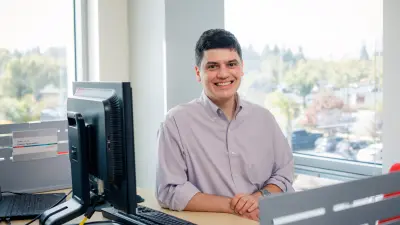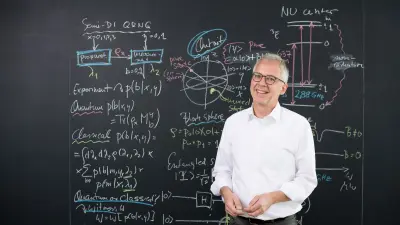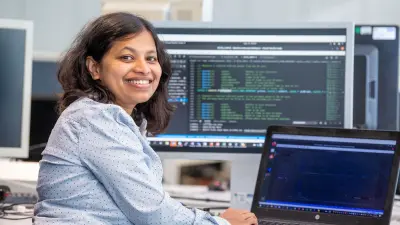Prof. Boris Kozinsky
Principal Scientist, Computational Materials Design
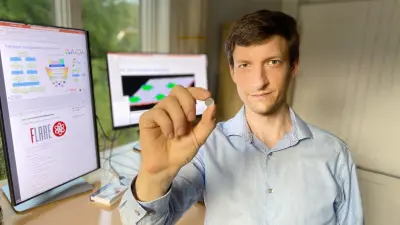
I established and led the direction on atomistic computational materials design at Bosch Research in North America. Our team uses algorithms, based on quantum physics, and high-performance computers to understand and design materials for next-generation alloys, batteries, semiconductors, coatings, sensors, and other technologies. In 2018 I started a new research group at Harvard University, focused on combining physics and machine learning models to describe transport properties and time evolution of complex materials. In this dual role, I work to bring together the talented researchers from the Bosch and Harvard teams and form close collaborations, creating new cutting edge methods to reveal the atomic details of how materials work and change.
Please tell us what fascinates you most about research.
The possibility to start from fundamental quantum physics equations and to accurately predict properties of real materials using computers still feels very magical to me. There is no better validation of the power and correctness of our understanding of the world of atoms and electrons than when such calculations lead to the invention of a completely new and better material.
What makes research done at Bosch so special?
Indepth fundamental investigations and new ideas are valued, while at the same time practical impact and speed are emphasized. This balance is quite unique at Bosch Research. The goal to design cleaner and more efficient technologies unites scientists in projects that span different teams and continents, creating a very diverse and stimulating research environment. You get to think about the whole picture, from the fundamental function of devices to the whole business and market economics and production processes.
What research topics are you currently working on at Bosch?
In our industry-academia partnership we are developing a new class of methods that have the accuracy of full quantum mechanical descriptions of electrons and atoms but are several orders of magnitude faster to solve. We do this by designing machine learning models based on physical symmetries and making them train automatically. We apply these methods to study phase transformations in alloys, ionic transport in electrolytes, and catalysis reactions. We also work on predicting electronic and thermal conductivity in semiconductors, which is important for designing power electronics and sensors.
What are the biggest scientific challenges in your field of research?
It is very difficult to understand exactly how realistic complex materials work, especially since we usually do not fully know their often imperfect composition and structure. Brute force simulation works in simple ideal cases, and to make progress we must be creative in combining experimentation and computation. The challenge lies in the vastly different time scales of the fast motion of individual atoms and overall slow evolution and response of materials. Bridging the gap between the fundamental equations and real-life applications requires a great deal of thinking, software development and methods innovation.
How do the results of your research become part of solutions “Invented for life”?
It is important to know that we are working on materials to enable technologies that can improve the world. New high-performance materials are at the core of next-generation products: fuel cells, drives, sensors, alloys, coatings, etc. Our work has led to the invention of new materials and computational methods that are being studied and used by industrial and academic applications, outside Bosch too.
Curriculum vitae
Since 2018
Professor of Computational Materials Science, Harvard University
2007
Founded the Bosch RTC Research Center in Cambridge MA
2007
PhD in Physics, MIT
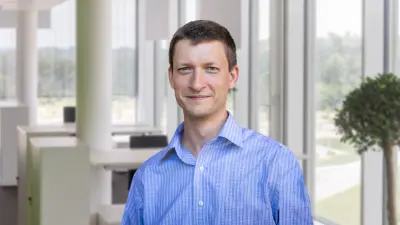
Selected publications

Pizzi et al. (2016)
- Giovanni Pizzi, Andrea Cepellotti, Riccardo Sabatini, Nicola Marzari, Boris Kozinsky
- Computational Materials Science, Volume 111, Pages 218-230

Vandermause et al. (2020)
- Jonathan Vandermause, Simon Batzner, Yu Xie, Lixin Sun & Boris Kozinsky
- npj Comput Mater 6, 20

Kozinsky et al. (2016)
- Boris Kozinsky, Sneha A. Akhade, Pierre Hirel, Adham Hashibon, Christian Elsässer, Prateek Mehta, Alan Logeat, and Ulrich Eisele
- Phys. Rev. Lett. 116, 055901

Samsonidze & Kozinsky (2018)
- Georgy Samsonidze, Boris Kozinsky
- Advanced Energy Materials, Volume 8, Issue 20
Get in touch with me
Prof. Boris Kozinsky
Principal Scientist, Computational Materials Design
